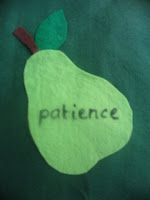I thought you might enjoy reading about the minutiae of my morning (and yes, there is a point to this). But if you want to skip straight to
the point, or if reading about someone's busy morning will leave you discouraged, feel free to scroll to the end of this post!
 Here's how my morning was shaping up:
Here's how my morning was shaping up:- Get out of bed. Feel tired. Feel discouraged about the number of things I should do today.
- Eat breakfast. Have shower. Get kids ready for the day.
- Think, "What I really want to do is sit at the computer and fiddle around."
Morning 1: what my day might have looked like.- Go on the computer and fiddle around. Look guilty when Steve gets back from taking the kids to school.
- Get up and do a bit of tidying. My aunt is coming for lunch tomorrow, and the house is a pigsty.
- Make a cup of tea, go on the computer and fiddle around. Or maybe read a book.
- Get up and feel discouraged about the tasks I haven't done. Think about going shopping, but realise I have no shopping list and Steve needs the car in less than an hour.
- Wipe down the bathrooms. Maybe. Put on a load of washing. If I think of it.
- Go on the computer and fiddle around.
- Make lunch. Read a book to Thomas. Feel discouraged about my unproductive morning. Have a nap.
- Go on the computer and fiddle around (it is my computer time, after all).
- Pick the kids up from school.
- Race around tidying, scribble a shopping list, and worry about everything I haven't done.
- Take the kids to gym. Go shopping.
- Get home exhausted, throw the cold things in the fridge, make dinner (barely) and serve it late.
- Leave the wet washing, the shopping bags, and the tidying for tomorrow.
Morning 2: what my morning really looked like.- Write a list of all the things I should do this morning:
shopping list / renew library books / finances / walk / tidy / clean bathrooms / shop / blog / washing / hang out washing
- Think, "What I really want to do is sit at the computer and fiddle around."
- Force my groaning brain and tired body over to the kitchen bench. Write a shopping list (I
hate writing shopping lists). Feel more cheerful.
- Steve takes the kids to school, comes home. Looks after the younger kids while I go for a walk.
- Go for a walk. Think about listening to a talk on my iPod. Pray for myself, Steve and the kids (in that order) instead. Pray that God would make my arms strong for my tasks, like the Proverbs 31 woman Claire Smith spoke about at Equip.
- Come home and, inspired by my prayer for Steve, ask if I can do anything to help. Am shocked at myself. He says no. Am slightly relieved.
- Think, "What I really want to do is sit at the computer and fiddle around."
- Use my strong hands to put a load of washing on instead.
- Go on the computer while the younger kids watch Playschool, but don't fiddle around. Do our finances for the week. Renew library books.
- Cross some tasks off my list. Feel good.
- Hang out the clothes.
- Go out and do our supermarket shopping for the week. Thomas needs to go to the toilet half way around the supermarket.
- Bring the car home just in time for Steve to drive to a lunchtime meeting. Give him a pile of coins for the parking meter.
- Go on the computer and fiddle around. That's what I'm doing now. I should probably be tidying and cleaning the bathrooms, but I wanted to share my morning with you.
the pointI don't tell you this to boast about my productive morning, or to make you feel bad if yours was less productive: you might have needed a quiet morning today.
But I want to share 3 things that can make a difference:
- write a list (don't all women love lists?);
- get started on our tasks even when we feel tired and discouraged;
- pray that God will give us strong arms for our tasks of love and service today.
I realised as I prayed that God makes our arms exactly as strong as they need to be. If yours are laid low by chronic fatigue syndrome, a night looking after sick children, or trouble and sorrow, then that is where God wants you to be right now. Who knows what glory for God and encouragement for others will flow from the situation you are in?
And for the record, I spent the first 2 days of this week sitting around and recovering from my busy weekend. Which was what was needed at that point. But today I just needed to get on with it.
May God make our arms strong for our tasks! (Prov. 31:17)
I'm going to tell you more about Claire Smith's excellent talk on the Proverbs 31 woman just as soon as I get around to it. Or buy the talks from Equip when they become available and listen to it yourself!























